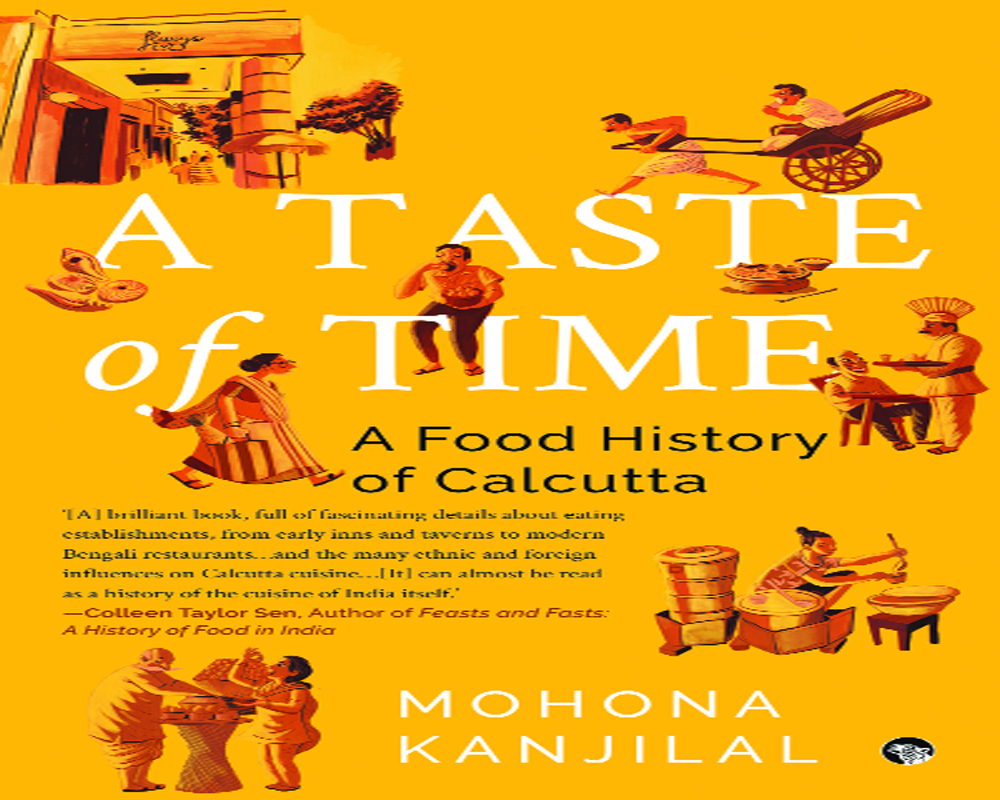A Taste of Time: A Food History of Calcutta
Author: Mohona Kanjilal
Publisher: Speaking Tiger, Rs 899
A Taste of Time: A Food History of Calcutta by Mohona Kanjilal is a well researched historical and cultural account of Calcutta’s rich gastronomical affair spanning centuries. An edited excerpt:
Bengali cuisine includes a wide variety of vegetarian dishes that have evolved over the years. Food historians are of the opinion that the widows of Bengal have greatly contributed to the evolution of its vegetarian cooking. They once led very repressive lives and were compelled to stick to a vegetarian diet though social progress has ensured that many of these restrictions are no longer observed or imposed. Their difficult lives included a lot of dietary restrictions. They were prohibited from eating high protein foods like meat, fish, eggs and even musur dal because these were believed to have libidinous effects. Garlic and onion were also banned for their alleged impassioning properties.
In the chapter ‘Bangla Ranna’ from their book, The Calcutta Cookbook: A Treasury of Recipes from Pavement to Palace (1995), the authors describe the plight of a Bengali widow, ‘In a secluded corner of the cookhouse, a widowed relative sits over her own stove. She has added delicate nuances to the rich vegetarian cornucopia of Bangla ranna. Her role in the kitchen warrants an explanation of her situation. Up to the turn of the century, a ten- or twelve-year-old girl was sometimes widowed and lived for the rest of her life dressed in white with her hair cropped, eating a radically vegetarian diet’ (pp. 35-36).
But, naturally, Bengali widows craved tasty food. Gradually, they decided to make the best of the bad bargain and began using their innovativeness to add colour to their fare. They started experimenting with the limited ingredients that went into their dishes in order to add more taste to them.
One of the things that they did was to think of different ways of making use of the wasted parts of vegetables instead of throwing them away. For example, they used the leftover peels and scrapings of vegetables to make simple but delicious preparations-something which is unique to Bengali cooking. Lauer khosha bhaja (fried peels of bottle gourd) is a preparation in which the thinly sliced peels of the vegetable are fried in hot mustard oil with a phoron of black mustard seeds and dried red chillies. Some salt and turmeric are added to the cooking. In alur khosha bhaja (fried peels of potato), the leftover potato peels are thoroughly washed, chopped and fried in hot mustard oil with a phoron of kalo jeera and dried red chillies. A pinch of salt and a small quantity of posto are added to the cooking. Both preparations are eaten with steamed rice.
Even the stalks of cauliflower and leafy green vegetables were not thrown away. Instead, chachchari preparations were made out of them. Chachchari usually implies a lightly spiced dry vegetable dish made with one or more varieties of vegetables. Often, the preparation is flavoured with mustard or poppy seeds paste. Sometimes, the stalks of cauliflower and leafy green vegetables, and even drumsticks, are cooked with vegetables to make this dish. Such chachchari preparations are known as danta chachchari (‘danta’ means ‘a succulent stalk’). Thus, in this land of plenty, the widows made thrift an integral part of Bengali cooking.
The widows even experimented with the bori (‘vadi’ in Hindi) or sun-dried lentil blob, which took on a more important role in their kitchens. Since it is made of lentil, they welcomed it as an optional source of protein. Most importantly, it added some variety to their frugal dishes. The boris were fried and added, in either whole or crumbled forms, to many of their dishes. Some of their shaak (leafy green vegetables) preparations like palong shaak and lal shaak (red spinach), and vegetable preparations like shukto (a bitter and mild mixed vegetables stew), alu begooner jhol (a lightly spiced curry of potatoes and aubergines), and ghanto, made with either lau (bottle gourd) or chaalkumro (ash gourd), featured boris.
A ghanto generally means a semi-dry vegetable dish made with either one or a few complementing vegetables, which are cooked with phoron, ground spices and a little bit of sugar. Boris often feature in ghanto preparations. A mixed vegetable ghanto, in which chopped potatoes, aubergines, hyacinth beans and radish are cooked in oil with a phoron of kalo jeera and dried red chillies, the pastes of turmeric, coriander and cumin, salt, sugar and fried boris, and seasoned with ghee, is commonly eaten with rice. Palong shaak, in traditional Bengali cuisine, is popularly cooked into a ghanto dish with vegetables like potatoes, pumpkin, aubergines and hyacinth beans. Boris are often used in this dish. Kochu shaak (stalks of colocasia leaves), a very popular leafy green vegetable in the culinary culture of East Bengal, is also used to make a ghanto dish. This ghanto preparation, which originally hails from Opar Bangla, is made with the boiled and mashed stalks of colocasia leaves, and features black chickpeas and coconut meat.
Fried boris were not only added to vegetarian preparations but they were also eaten plain. The widows even devised curry dishes made only with these blobs like borir jhal and bori posto. ‘Jhal’, literally meaning ‘hot’, is generally a preparation of fish, shrimp or crab cooked in mustard paste or with the paste of dried red chillies. Borir jhal can also be made in either of the two ways. Fried boris are also cooked in a paste of poppy seeds, lending the dish the name, bori posto.
Excerpted with permission from A Taste of Time: A Food History of Calcutta by Mohona Kanjilal. Published by Speaking Tiger, 2021


























